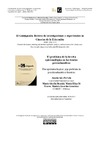Identificador persistente para citar o vincular este elemento:
https://accedacris.ulpgc.es/jspui/handle/10553/55178
| Campo DC | Valor | idioma |
|---|---|---|
| dc.contributor.author | Portela, Analía Inés | en_US |
| dc.contributor.author | Boarini, María Gisella | en_US |
| dc.contributor.author | Di Marco, María Elisa | en_US |
| dc.contributor.author | González, Mariela Lourdes | en_US |
| dc.date.accessioned | 2019-03-25T18:41:44Z | - |
| dc.date.available | 2019-03-25T18:41:44Z | - |
| dc.date.issued | 2018 | en_US |
| dc.identifier.issn | 0213-0610 | en_US |
| dc.identifier.uri | https://accedacris.ulpgc.es/handle/10553/55178 | - |
| dc.description.abstract | Este artículo pretende dilucidar las posturas epistemológicas actuales que fundamentan, implícita o explícitamente, el ámbito de la Psicología de la Educación. Explicitar los supuestos de estos enfoques y perspectivas nos permitirá ubicarlas en el contexto general de las discusiones epistemológicas en torno a las Ciencias de la Educación y en el ámbito particular de la Psicología de la Educación. En este sentido, analizaremos cuáles son los elementos que manifiestan la brecha epistemológica y sus causas, como así también, las problemáticas epistemológicas que se detectan en lo que se denomina como teorías de la Epistemología personal -EP-. A partir del análisis hermenéutico efectuado se concluye la necesidad de superar el uso funcional del término “epistemología”, lo cual permitirá adentrarse en la discusión sobre el problema de la inconmensurabilidad de las teorías científicas. Solo de ese modo podremos superar las críticas a la concepción empirista y rescatar al mismo tiempo la legitimidad de la empresa científica. | en_US |
| dc.description.abstract | This article aims to elucidate the current epistemological positions that implicitly or explicitly support the field of Educational Psychology. To clarify the assumptions of these approaches and perspectives will allow us to place them in the general context of the epistemological discussions around the Sciences of education and in the particular field of Educational Psychology. In this sense, we will analyze what are the elements that manifest the epistemological gap and its causes, as well as the epistemological problems that are detected in what are known as theories of personal epistemology -EP-. From the hermeneutical analysis carried out, the need to overcome the functional use of the term "epistemology" is concluded, which will allow us to delve into the discussion of the problem of the incommensurability of scientific theories. Only in this way can we overcome criticism of the empiricist conception and at the same time rescue the legitimacy of the scientific enterprise. | en_US |
| dc.language | spa | en_US |
| dc.relation.ispartof | El Guiniguada | en_US |
| dc.source | El Guiniguada [ISSN 0213-0610], v. 27, p. 71-82 | en_US |
| dc.subject | 58 Pedagogía | en_US |
| dc.subject | 531204 Educación | en_US |
| dc.subject.other | Psicología de la educación | en_US |
| dc.subject.other | Epistemología | en_US |
| dc.subject.other | Ciencias de la educación | en_US |
| dc.subject.other | Educational psychology | en_US |
| dc.title | El problema de la brecha epistemológica en las teorías psicoeducativas | en_US |
| dc.title.alternative | The epistemological gap problem in psychoeducative theories | en_US |
| dc.type | info:eu-repo/semantics/article | es |
| dc.type | Article | es |
| dc.identifier.eissn | 2386-3374 | - |
| dc.description.lastpage | 82 | - |
| dc.description.firstpage | 71 | - |
| dc.relation.volume | 27 | - |
| dc.investigacion | Artes y Humanidades | en_US |
| dc.type2 | Artículo | en_US |
| dc.identifier.ulpgc | Sí | es |
| dc.description.sellofecyt | Sello FECYT | |
| dc.description.esci | ESCI | |
| dc.description.dialnetimpact | 0,0 | |
| dc.description.dialnetq | Q4 | |
| dc.description.erihplus | ERIH PLUS | |
| item.grantfulltext | open | - |
| item.fulltext | Con texto completo | - |
| Colección: | Artículos | |
Visitas 5
269
actualizado el 11-ene-2026
Descargas
106
actualizado el 11-ene-2026
Google ScholarTM
Verifica
Comparte
Exporta metadatos
Los elementos en ULPGC accedaCRIS están protegidos por derechos de autor con todos los derechos reservados, a menos que se indique lo contrario.
